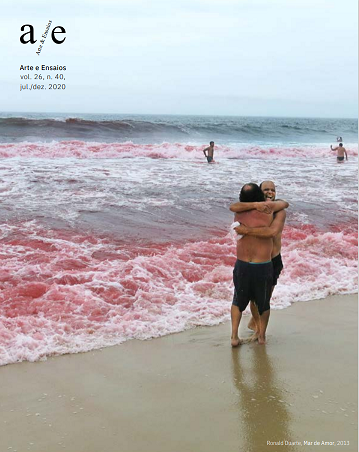O CORPO FEMININO NA TELA: DESAFIOS POLITICO-AFETIVOS E OS SENTIDOS POÉTICOS NA REALIZAÇÃO DE UM CURTA-METRAGEM / The female body on-screen: political-affective challenges and poetic meanings in the making of a short film
DOI:
https://doi.org/10.37235/ae.n40.3Abstract
O artigo apresenta uma reflexão sobre a vitalidade político-afetiva do corpo feminino na tela a partir da realização de um curta-metragem, Femme (2016). Minha aspiração artística com o filme foi de transmutar os significados afetivos usualmente associados ao corpo feminino e trabalhar com sua visualidade extrema no limiar estético entre o belo e o abjeto. Ao lidar com a exibição de certos conteúdos do corpo visceral, a artista pode enfrentar um desafio duplo: se há o risco de se ser meramente apelativo aos sentidos, há também o risco de se repetir uma certa poética da abjeção que se tornou padrão no artes. Em seu processo, o filme-experimento levou-me a combinar elementos singulares a partir do retrato de uma personagem e a gerar, de modo inesperado e contundente, indícios acerca das forças poéticas do corpo e da imagem no contexto contemporâneo.
Palavras-chave: Imagem; Corpo; Poética; Afetos; Cinema.
Abstract
The article provides a reflection on the political-affective vitality of the body on-screen based on the making of a short film, Femme (2016). My artistic aspiration with the film was to question the usual affective meanings of the female body and work with extreme visuality at the thresholds of the beautiful and the abject. In dealing with the display of visceral body contents, an artist might face a double challenge: on the one hand, there is a risk of being too appealing to the senses; on the other, one risks repeating a poetics of abjection that has become standard in the arts. This film-experiment led me to gather unique elements in the making of it as a portrait of a character and generate unexpected evidence on the poetic force of the body and image in the contemporary context.
Keywords: Image; Body; Poetics; Affect; Film.
References
BUCKLEY, Thomas; GOTTLIEB, Alma (eds). Blood Magic, the Anthropology of Menstruation. Berkeley: University of California Press. 1998.
CATHERINE, Breillat. Pornocratie. Paris: Denoël, 2001.
HUTCHINSON, Mark. “The History of “The Origin of the World.” In. The Times Literary Supplement. London, ago 2007.
KRISTEVA, Julia. Powers of Horror, An Essay on Abjection. Translated by Leon S. Roudiez. New York: Columbia U.P, 1982.
LENNON, Kathleen. “Feminist Perspectives on the Body,” The Stanford Encyclopedia of Philosophy, ed. Edward N. Zalta, 2014. Disponível em: https://plato.stanford.edu/archives/fall2014/entries/feminist-body . Acesso em 8 fev 2017.
MENNINGHAUS, Winfried. Disgust: Theory and History of a Strong Sensation. Translated by Howard Eiland and Joel Golb. Albany, NY: State University of New York Press, 2003.
MULVEY, Laura. Death 24x a Second: Stillness and the Moving Image. London: Reaktion Books, 2006.
VIRILIO, Paul. Art and Fear. London: Continuum, 2006.
WEISS, Gail. Body Images: Embodiment as Intercorporeality. New York: Routledge, 1999.
ŽIŽEK, Slavoj. The Fragile Absolute or Why is the Christian Legacy Worth Fighting for? London & New York: Verso, 2000.
Downloads
Additional Files
Published
Issue
Section
License
Autores que publicam nesta revista concordam com os seguintes termos:- Autores mantém os direitos autorais e concedem à revista o direito de primeira publicação, com o trabalho simultaneamente licenciado sob a Licença Creative Commons Attribution que permite o compartilhamento do trabalho com reconhecimento da autoria e publicação inicial nesta revista.
- Autores têm autorização para assumir contratos adicionais separadamente, para distribuição não-exclusiva da versão do trabalho publicada nesta revista (ex.: publicar em repositório institucional ou como capítulo de livro), com reconhecimento de autoria e publicação inicial nesta revista.
- Autores têm permissão e são estimulados a publicar e distribuir seu trabalho online (ex.: em repositórios institucionais ou na sua página pessoal) a qualquer ponto antes ou durante o processo editorial, já que isso pode gerar alterações produtivas, bem como aumentar o impacto e a citação do trabalho publicado (Veja O Efeito do Acesso Livre).


